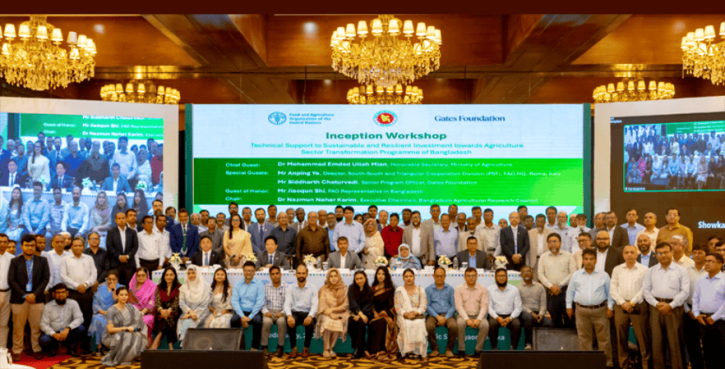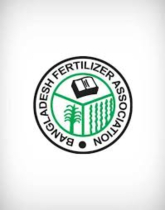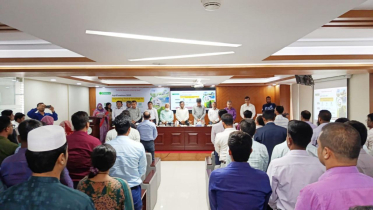
The Ministry of Agriculture (MoA) of Bangladesh, in collaboration with the Food and Agriculture Organization of the United Nations (FAO) and with financial backing from the Bill & Melinda Gates Foundation, officially launched the Technical Support to Sustainable and Resilient Investment Towards Agriculture Sector Transformation Programme (AsTP) today at a high-level inception workshop in Dhaka.
Held at the Pan Pacific Sonargaon, the event marked a significant step in Bangladesh’s efforts to modernize its agriculture sector, enhancing sustainability, resilience, and productivity amid increasing local and global challenges.
The AsTP is part of the Government's broader Agriculture Transformation Programme (ATP). It aims to catalyze systemic change through evidence-based planning, regional investment strategies, and stronger institutional capacities. The initiative aligns with key national policies, including the Bangladesh Delta Plan 2100 and the National Agriculture Policy 2018.
Approved by the Executive Committee of the National Economic Council (ECNEC) in April 2025 and endorsed by the Economic Relations Division in March, the project will be implemented by FAO, with the Bangladesh Agricultural Research Council (BARC) serving as the lead executing agency. Other key government partners include the Department of Agricultural Extension (DAE), Bangladesh Agricultural Development Corporation (BADC), Bangladesh Agricultural Research Institute (BARI), and Bangladesh Rice Research Institute (BRRI).
The inception event was attended by over 150 participants, including senior government officials, development partners, private sector representatives, academics, and civil society members. Chief Guest Dr. Mohammad Emdad Ullah Mian, Secretary of the Ministry of Agriculture, emphasized the importance of the initiative.
“The AsTP project comes at a crucial time as Bangladesh redefines its agricultural priorities ahead of LDC graduation. It will help us align national policy with evidence, invest strategically, and empower institutions to deliver,” Dr. Mian said.
Anping Ye, Director of the South-South and Triangular Cooperation Division at FAO Headquarters, highlighted the project’s value in adapting global knowledge to local realities:
“AsTP reflects mutual learning and co-creation. It’s about turning global innovations into local impact.”
Jiaoqun Shi, FAO Representative in Bangladesh, added:
“With the Government of Bangladesh, FAO, and the Gates Foundation united, AsTP is not just a partnership—it’s a bold step toward long-term transformation aligned with national priorities.”
Project Focus and Components
The AsTP is built around three core components:
-
Evidence-Based Planning – Using FAO’s MAFAP framework to optimize public agricultural spending and inform investments.
-
Regional Investment Plans – Designing inclusive, climate-resilient strategies for six agro-ecological zones through consultations and diagnostics.
-
Innovation & Institutional Strengthening – Piloting technologies such as IoT systems, Global GAP alignment, and digital agriculture tools, while promoting global knowledge exchange via South-South and Triangular Cooperation (SSTC).
During the workshop, participants engaged in technical discussions and a panel session exploring how vision can be translated into action through data-driven decision-making, coordinated investment, and institutional readiness.
As Bangladesh moves forward with the AsTP, stakeholders reaffirmed their commitment to a collaborative, inclusive, and forward-looking agricultural transformation. The project is expected to play a central role in meeting the country’s development goals through Better Production, Better Nutrition, a Better Environment, and a Better Life for all.





